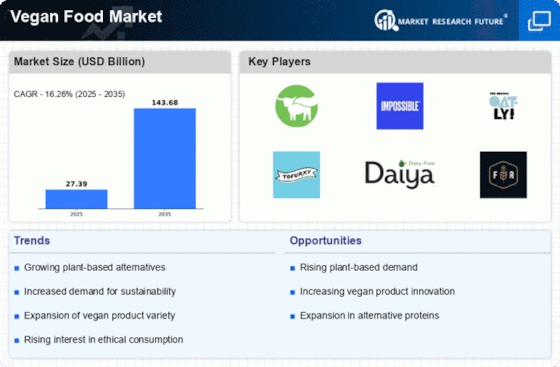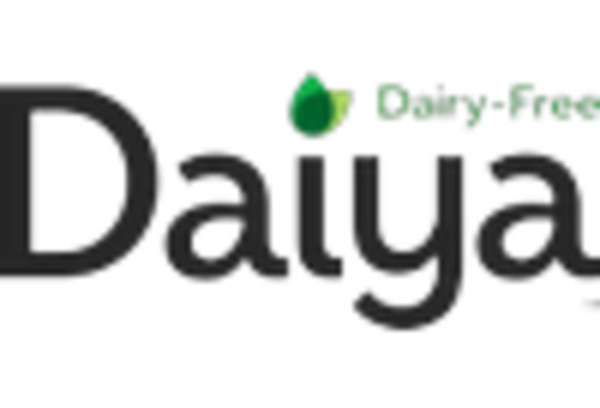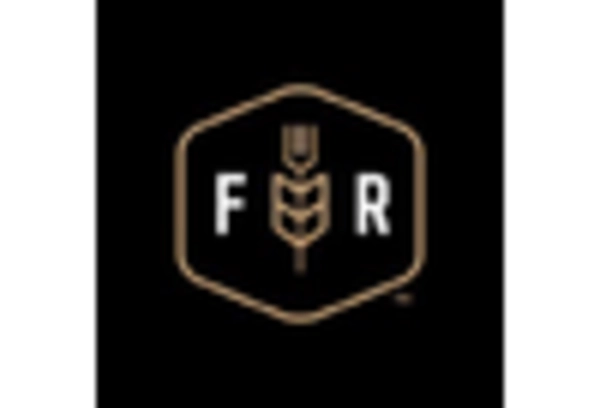Vegan Meat
Dairy Alternatives
Plant-Based Snacks
Vegan Sauces
Vegan Bakery Products
Supermarkets/Hypermarkets
Online Retail
Specialty Stores
Convenience Stores
Frozen
Chilled
Shelf-Stable
Children
Adults
Seniors
North America
Europe
South America
Asia Pacific
Middle East and Africa
North America Outlook (USD Billion, 2019-2035)
North America Vegan Food Market by Product Type
Vegan Meat
Dairy Alternatives
Plant-Based Snacks
Vegan Sauces
Vegan Bakery Products
North America Vegan Food Market by Distribution Channel Type
Supermarkets/Hypermarkets
Online Retail
Specialty Stores
Convenience Stores
North America Vegan Food Market by Form Type
Frozen
Chilled
Shelf-Stable
North America Vegan Food Market by Consumer Age Group Type
Children
Adults
Seniors
North America Vegan Food Market by Regional Type
US
Canada
US Outlook (USD Billion, 2019-2035)
US Vegan Food Market by Product Type
Vegan Meat
Dairy Alternatives
Plant-Based Snacks
Vegan Sauces
Vegan Bakery Products
US Vegan Food Market by Distribution Channel Type
Supermarkets/Hypermarkets
Online Retail
Specialty Stores
Convenience Stores
US Vegan Food Market by Form Type
Frozen
Chilled
Shelf-Stable
US Vegan Food Market by Consumer Age Group Type
Children
Adults
Seniors
CANADA Outlook (USD Billion, 2019-2035)
CANADA Vegan Food Market by Product Type
Vegan Meat
Dairy Alternatives
Plant-Based Snacks
Vegan Sauces
Vegan Bakery Products
CANADA Vegan Food Market by Distribution Channel Type
Supermarkets/Hypermarkets
Online Retail
Specialty Stores
Convenience Stores
CANADA Vegan Food Market by Form Type
Frozen
Chilled
Shelf-Stable
CANADA Vegan Food Market by Consumer Age Group Type
Children
Adults
Seniors
Europe Outlook (USD Billion, 2019-2035)
Europe Vegan Food Market by Product Type
Vegan Meat
Dairy Alternatives
Plant-Based Snacks
Vegan Sauces
Vegan Bakery Products
Europe Vegan Food Market by Distribution Channel Type
Supermarkets/Hypermarkets
Online Retail
Specialty Stores
Convenience Stores
Europe Vegan Food Market by Form Type
Frozen
Chilled
Shelf-Stable
Europe Vegan Food Market by Consumer Age Group Type
Children
Adults
Seniors
Europe Vegan Food Market by Regional Type
Germany
UK
France
Russia
Italy
Spain
Rest of Europe
GERMANY Outlook (USD Billion, 2019-2035)
GERMANY Vegan Food Market by Product Type
Vegan Meat
Dairy Alternatives
Plant-Based Snacks
Vegan Sauces
Vegan Bakery Products
GERMANY Vegan Food Market by Distribution Channel Type
Supermarkets/Hypermarkets
Online Retail
Specialty Stores
Convenience Stores
GERMANY Vegan Food Market by Form Type
Frozen
Chilled
Shelf-Stable
GERMANY Vegan Food Market by Consumer Age Group Type
Children
Adults
Seniors
UK Outlook (USD Billion, 2019-2035)
UK Vegan Food Market by Product Type
Vegan Meat
Dairy Alternatives
Plant-Based Snacks
Vegan Sauces
Vegan Bakery Products
UK Vegan Food Market by Distribution Channel Type
Supermarkets/Hypermarkets
Online Retail
Specialty Stores
Convenience Stores
UK Vegan Food Market by Form Type
Frozen
Chilled
Shelf-Stable
UK Vegan Food Market by Consumer Age Group Type
Children
Adults
Seniors
FRANCE Outlook (USD Billion, 2019-2035)
FRANCE Vegan Food Market by Product Type
Vegan Meat
Dairy Alternatives
Plant-Based Snacks
Vegan Sauces
Vegan Bakery Products
FRANCE Vegan Food Market by Distribution Channel Type
Supermarkets/Hypermarkets
Online Retail
Specialty Stores
Convenience Stores
FRANCE Vegan Food Market by Form Type
Frozen
Chilled
Shelf-Stable
FRANCE Vegan Food Market by Consumer Age Group Type
Children
Adults
Seniors
RUSSIA Outlook (USD Billion, 2019-2035)
RUSSIA Vegan Food Market by Product Type
Vegan Meat
Dairy Alternatives
Plant-Based Snacks
Vegan Sauces
Vegan Bakery Products
RUSSIA Vegan Food Market by Distribution Channel Type
Supermarkets/Hypermarkets
Online Retail
Specialty Stores
Convenience Stores
RUSSIA Vegan Food Market by Form Type
Frozen
Chilled
Shelf-Stable
RUSSIA Vegan Food Market by Consumer Age Group Type
Children
Adults
Seniors
ITALY Outlook (USD Billion, 2019-2035)
ITALY Vegan Food Market by Product Type
Vegan Meat
Dairy Alternatives
Plant-Based Snacks
Vegan Sauces
Vegan Bakery Products
ITALY Vegan Food Market by Distribution Channel Type
Supermarkets/Hypermarkets
Online Retail
Specialty Stores
Convenience Stores
ITALY Vegan Food Market by Form Type
Frozen
Chilled
Shelf-Stable
ITALY Vegan Food Market by Consumer Age Group Type
Children
Adults
Seniors
SPAIN Outlook (USD Billion, 2019-2035)
SPAIN Vegan Food Market by Product Type
Vegan Meat
Dairy Alternatives
Plant-Based Snacks
Vegan Sauces
Vegan Bakery Products
SPAIN Vegan Food Market by Distribution Channel Type
Supermarkets/Hypermarkets
Online Retail
Specialty Stores
Convenience Stores
SPAIN Vegan Food Market by Form Type
Frozen
Chilled
Shelf-Stable
SPAIN Vegan Food Market by Consumer Age Group Type
Children
Adults
Seniors
REST OF EUROPE Outlook (USD Billion, 2019-2035)
REST OF EUROPE Vegan Food Market by Product Type
Vegan Meat
Dairy Alternatives
Plant-Based Snacks
Vegan Sauces
Vegan Bakery Products
REST OF EUROPE Vegan Food Market by Distribution Channel Type
Supermarkets/Hypermarkets
Online Retail
Specialty Stores
Convenience Stores
REST OF EUROPE Vegan Food Market by Form Type
Frozen
Chilled
Shelf-Stable
REST OF EUROPE Vegan Food Market by Consumer Age Group Type
Children
Adults
Seniors
APAC Outlook (USD Billion, 2019-2035)
APAC Vegan Food Market by Product Type
Vegan Meat
Dairy Alternatives
Plant-Based Snacks
Vegan Sauces
Vegan Bakery Products
APAC Vegan Food Market by Distribution Channel Type
Supermarkets/Hypermarkets
Online Retail
Specialty Stores
Convenience Stores
APAC Vegan Food Market by Form Type
Frozen
Chilled
Shelf-Stable
APAC Vegan Food Market by Consumer Age Group Type
Children
Adults
Seniors
APAC Vegan Food Market by Regional Type
China
India
Japan
South Korea
Malaysia
Thailand
Indonesia
Rest of APAC
CHINA Outlook (USD Billion, 2019-2035)
CHINA Vegan Food Market by Product Type
Vegan Meat
Dairy Alternatives
Plant-Based Snacks
Vegan Sauces
Vegan Bakery Products
CHINA Vegan Food Market by Distribution Channel Type
Supermarkets/Hypermarkets
Online Retail
Specialty Stores
Convenience Stores
CHINA Vegan Food Market by Form Type
Frozen
Chilled
Shelf-Stable
CHINA Vegan Food Market by Consumer Age Group Type
Children
Adults
Seniors
INDIA Outlook (USD Billion, 2019-2035)
INDIA Vegan Food Market by Product Type
Vegan Meat
Dairy Alternatives
Plant-Based Snacks
Vegan Sauces
Vegan Bakery Products
INDIA Vegan Food Market by Distribution Channel Type
Supermarkets/Hypermarkets
Online Retail
Specialty Stores
Convenience Stores
INDIA Vegan Food Market by Form Type
Frozen
Chilled
Shelf-Stable
INDIA Vegan Food Market by Consumer Age Group Type
Children
Adults
Seniors
JAPAN Outlook (USD Billion, 2019-2035)
JAPAN Vegan Food Market by Product Type
Vegan Meat
Dairy Alternatives
Plant-Based Snacks
Vegan Sauces
Vegan Bakery Products
JAPAN Vegan Food Market by Distribution Channel Type
Supermarkets/Hypermarkets
Online Retail
Specialty Stores
Convenience Stores
JAPAN Vegan Food Market by Form Type
Frozen
Chilled
Shelf-Stable
JAPAN Vegan Food Market by Consumer Age Group Type
Children
Adults
Seniors
SOUTH KOREA Outlook (USD Billion, 2019-2035)
SOUTH KOREA Vegan Food Market by Product Type
Vegan Meat
Dairy Alternatives
Plant-Based Snacks
Vegan Sauces
Vegan Bakery Products
SOUTH KOREA Vegan Food Market by Distribution Channel Type
Supermarkets/Hypermarkets
Online Retail
Specialty Stores
Convenience Stores
SOUTH KOREA Vegan Food Market by Form Type
Frozen
Chilled
Shelf-Stable
SOUTH KOREA Vegan Food Market by Consumer Age Group Type
Children
Adults
Seniors
MALAYSIA Outlook (USD Billion, 2019-2035)
MALAYSIA Vegan Food Market by Product Type
Vegan Meat
Dairy Alternatives
Plant-Based Snacks
Vegan Sauces
Vegan Bakery Products
MALAYSIA Vegan Food Market by Distribution Channel Type
Supermarkets/Hypermarkets
Online Retail
Specialty Stores
Convenience Stores
MALAYSIA Vegan Food Market by Form Type
Frozen
Chilled
Shelf-Stable
MALAYSIA Vegan Food Market by Consumer Age Group Type
Children
Adults
Seniors
THAILAND Outlook (USD Billion, 2019-2035)
THAILAND Vegan Food Market by Product Type
Vegan Meat
Dairy Alternatives
Plant-Based Snacks
Vegan Sauces
Vegan Bakery Products
THAILAND Vegan Food Market by Distribution Channel Type
Supermarkets/Hypermarkets
Online Retail
Specialty Stores
Convenience Stores
THAILAND Vegan Food Market by Form Type
Frozen
Chilled
Shelf-Stable
THAILAND Vegan Food Market by Consumer Age Group Type
Children
Adults
Seniors
INDONESIA Outlook (USD Billion, 2019-2035)
INDONESIA Vegan Food Market by Product Type
Vegan Meat
Dairy Alternatives
Plant-Based Snacks
Vegan Sauces
Vegan Bakery Products
INDONESIA Vegan Food Market by Distribution Channel Type
Supermarkets/Hypermarkets
Online Retail
Specialty Stores
Convenience Stores
INDONESIA Vegan Food Market by Form Type
Frozen
Chilled
Shelf-Stable
INDONESIA Vegan Food Market by Consumer Age Group Type
Children
Adults
Seniors
REST OF APAC Outlook (USD Billion, 2019-2035)
REST OF APAC Vegan Food Market by Product Type
Vegan Meat
Dairy Alternatives
Plant-Based Snacks
Vegan Sauces
Vegan Bakery Products
REST OF APAC Vegan Food Market by Distribution Channel Type
Supermarkets/Hypermarkets
Online Retail
Specialty Stores
Convenience Stores
REST OF APAC Vegan Food Market by Form Type
Frozen
Chilled
Shelf-Stable
REST OF APAC Vegan Food Market by Consumer Age Group Type
Children
Adults
Seniors
South America Outlook (USD Billion, 2019-2035)
South America Vegan Food Market by Product Type
Vegan Meat
Dairy Alternatives
Plant-Based Snacks
Vegan Sauces
Vegan Bakery Products
South America Vegan Food Market by Distribution Channel Type
Supermarkets/Hypermarkets
Online Retail
Specialty Stores
Convenience Stores
South America Vegan Food Market by Form Type
Frozen
Chilled
Shelf-Stable
South America Vegan Food Market by Consumer Age Group Type
Children
Adults
Seniors
South America Vegan Food Market by Regional Type
Brazil
Mexico
Argentina
Rest of South America
BRAZIL Outlook (USD Billion, 2019-2035)
BRAZIL Vegan Food Market by Product Type
Vegan Meat
Dairy Alternatives
Plant-Based Snacks
Vegan Sauces
Vegan Bakery Products
BRAZIL Vegan Food Market by Distribution Channel Type
Supermarkets/Hypermarkets
Online Retail
Specialty Stores
Convenience Stores
BRAZIL Vegan Food Market by Form Type
Frozen
Chilled
Shelf-Stable
BRAZIL Vegan Food Market by Consumer Age Group Type
Children
Adults
Seniors
MEXICO Outlook (USD Billion, 2019-2035)
MEXICO Vegan Food Market by Product Type
Vegan Meat
Dairy Alternatives
Plant-Based Snacks
Vegan Sauces
Vegan Bakery Products
MEXICO Vegan Food Market by Distribution Channel Type
Supermarkets/Hypermarkets
Online Retail
Specialty Stores
Convenience Stores
MEXICO Vegan Food Market by Form Type
Frozen
Chilled
Shelf-Stable
MEXICO Vegan Food Market by Consumer Age Group Type
Children
Adults
Seniors
ARGENTINA Outlook (USD Billion, 2019-2035)
ARGENTINA Vegan Food Market by Product Type
Vegan Meat
Dairy Alternatives
Plant-Based Snacks
Vegan Sauces
Vegan Bakery Products
ARGENTINA Vegan Food Market by Distribution Channel Type
Supermarkets/Hypermarkets
Online Retail
Specialty Stores
Convenience Stores
ARGENTINA Vegan Food Market by Form Type
Frozen
Chilled
Shelf-Stable
ARGENTINA Vegan Food Market by Consumer Age Group Type
Children
Adults
Seniors
REST OF SOUTH AMERICA Outlook (USD Billion, 2019-2035)
REST OF SOUTH AMERICA Vegan Food Market by Product Type
Vegan Meat
Dairy Alternatives
Plant-Based Snacks
Vegan Sauces
Vegan Bakery Products
REST OF SOUTH AMERICA Vegan Food Market by Distribution Channel Type
Supermarkets/Hypermarkets
Online Retail
Specialty Stores
Convenience Stores
REST OF SOUTH AMERICA Vegan Food Market by Form Type
Frozen
Chilled
Shelf-Stable
REST OF SOUTH AMERICA Vegan Food Market by Consumer Age Group Type
Children
Adults
Seniors
MEA Outlook (USD Billion, 2019-2035)
MEA Vegan Food Market by Product Type
Vegan Meat
Dairy Alternatives
Plant-Based Snacks
Vegan Sauces
Vegan Bakery Products
MEA Vegan Food Market by Distribution Channel Type
Supermarkets/Hypermarkets
Online Retail
Specialty Stores
Convenience Stores
MEA Vegan Food Market by Form Type
Frozen
Chilled
Shelf-Stable
MEA Vegan Food Market by Consumer Age Group Type
Children
Adults
Seniors
MEA Vegan Food Market by Regional Type
GCC Countries
South Africa
Rest of MEA
GCC COUNTRIES Outlook (USD Billion, 2019-2035)
GCC COUNTRIES Vegan Food Market by Product Type
Vegan Meat
Dairy Alternatives
Plant-Based Snacks
Vegan Sauces
Vegan Bakery Products
GCC COUNTRIES Vegan Food Market by Distribution Channel Type
Supermarkets/Hypermarkets
Online Retail
Specialty Stores
Convenience Stores
GCC COUNTRIES Vegan Food Market by Form Type
Frozen
Chilled
Shelf-Stable
GCC COUNTRIES Vegan Food Market by Consumer Age Group Type
Children
Adults
Seniors
SOUTH AFRICA Outlook (USD Billion, 2019-2035)
SOUTH AFRICA Vegan Food Market by Product Type
Vegan Meat
Dairy Alternatives
Plant-Based Snacks
Vegan Sauces
Vegan Bakery Products
SOUTH AFRICA Vegan Food Market by Distribution Channel Type
Supermarkets/Hypermarkets
Online Retail
Specialty Stores
Convenience Stores
SOUTH AFRICA Vegan Food Market by Form Type
Frozen
Chilled
Shelf-Stable
SOUTH AFRICA Vegan Food Market by Consumer Age Group Type
Children
Adults
Seniors
REST OF MEA Outlook (USD Billion, 2019-2035)
REST OF MEA Vegan Food Market by Product Type
Vegan Meat
Dairy Alternatives
Plant-Based Snacks
Vegan Sauces
Vegan Bakery Products
REST OF MEA Vegan Food Market by Distribution Channel Type
Supermarkets/Hypermarkets
Online Retail
Specialty Stores
Convenience Stores
REST OF MEA Vegan Food Market by Form Type
Frozen
Chilled
Shelf-Stable
REST OF MEA Vegan Food Market by Consumer Age Group Type
Children
Adults
Seniors


















Leave a Comment